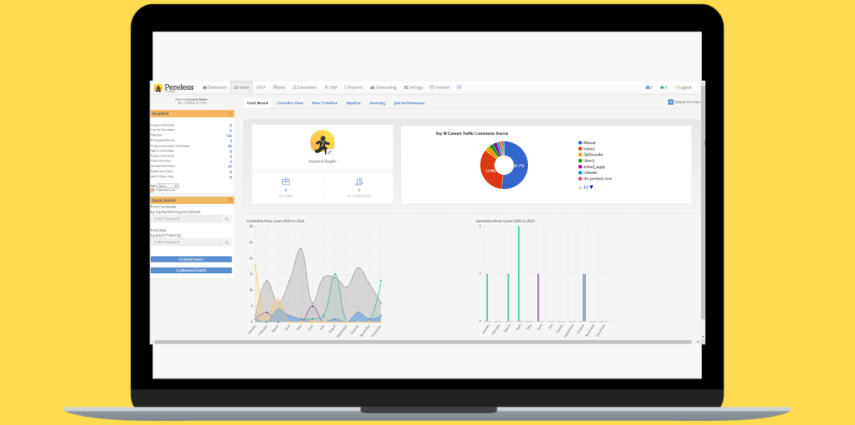At Pereless Systems, our CEO, Arthur Pereless, and CTO, Frank Su, have been in the recruiting business for over 25 years. With their shared level of expertise, they shared their insights and strategies for effective recruiting. Join us as we uncover the strategies employed by industry leaders to attract top-tier candidates and build winning teams. Say goodbye to recruitment challenges and hello to a new era of hiring excellence. Let’s embark on this journey together and revolutionize your recruiting efforts starting today!
I. We asked the experts: How Does Advanced Recruiting Processes and Software Play Into the Talent Management Space?
Recruiting processes and software play a crucial role in the success of modern companies. In today’s market, the war for top talent is fierce, and having an effective recruitment strategy can make all the difference.
One of the key reasons why effective recruiting is so important for companies today is because it directly impacts the quality of the workforce. By hiring the right people for the job, companies can improve productivity, increase innovation, and drive overall business success. On the other hand, making poor hiring decisions can result in high turnover rates, decreased morale, and ultimately, a negative impact on the bottom line.
In addition, effective recruiting processes can help companies stay competitive in their industry. With the rise of technology and globalization, businesses need to be able to adapt quickly to changing market conditions. Having a strong recruitment strategy in place allows companies to attract and retain the best talent, ensuring they have the skills and expertise needed to stay ahead of the competition.
Furthermore, recruiting software has made the hiring process more efficient and streamlined than ever before. By leveraging the latest technology, companies can automate tasks, track candidate data, and even predict future hiring needs. This not only saves time and resources but also ensures that companies are able to make more informed hiring decisions.
Overall, the importance of effective recruiting for companies today cannot be overstated. By investing in the right processes and software, businesses can build a strong workforce, stay competitive in their industry, and ultimately drive success.
II. Understanding the Modern Recruitment Landscape:
In today’s modern recruitment landscape, technology plays a crucial role in the way companies attract and hire the best talent. Social media platforms, job search websites, and digital recruitment tools have revolutionized the way employers reach out to potential candidates and vice versa.
Organizations are now able to quickly and efficiently screen large volumes of applicants using automated systems and artificial intelligence. This has streamlined the recruitment process, allowing hiring managers to focus more on finding the right fit for their company culture and needs. Additionally, the rise of the gig economy and remote work has transformed the traditional 9-5 office job model. More and more companies are embracing flexible work arrangements and seeking candidates who are able to work remotely. This has opened up new opportunities for both employers and job seekers, allowing for greater flexibility and work-life balance.
Overall, the modern recruitment landscape is dynamic and ever-evolving, with technology playing a central role in shaping the way companies find and hire talent. As the workforce continues to change and adapt to new challenges, companies must stay ahead of the curve in order to attract and retain top talent in today’s competitive job market.
III. Why Building a Strong Employer Brand Assists In Recruiting:
A strong employer brand is crucial in today’s recruiting environment for several reasons. Firstly, in a highly competitive job market, a strong employer brand can set a company apart from its competitors and attract top talent. A positive reputation as a desirable place to work can help companies attract and retain skilled employees who are looking for more than just a paycheck.
Moreover, a strong employer brand can also help companies save on recruiting costs. When a company has a well-known and respected brand, they will receive a higher volume of qualified applicants, reducing the need for expensive recruiting campaigns. Additionally, employees who are proud to work for a company with a strong employer brand are more likely to refer their friends and colleagues, further reducing recruiting costs.
Furthermore, a strong employer brand can also improve employee morale and engagement. When employees feel proud to work for a company with a positive reputation, they are more likely to be engaged and motivated in their work. This can lead to higher productivity, better teamwork, and ultimately, improved business results.
In conclusion, a strong employer brand is essential in today’s recruiting environment for attracting top talent, saving on recruiting costs, improving employee morale and engagement, and ultimately, driving business success. Companies that invest in building and maintaining a strong employer brand will have a competitive advantage in the marketplace and be better positioned for long-term success.
IV. Mastering the Recruitment Funnel, Building Process:
The recruitment funnel is a crucial tool for companies looking to hire top talent. Experts in recruitment understand the importance of mastering the recruitment funnel in order to attract and retain the best candidates.
To begin with, these experts carefully map out the different stages of the recruitment funnel, from sourcing and screening candidates to making offers and onboarding new hires. By understanding each stage of the process, they are able to streamline their recruitment efforts and increase their chances of success.
In addition, these experts utilize data and analytics to track their recruitment efforts and identify areas for improvement. By analyzing key metrics such as time-to-fill, cost-per-hire, and candidate satisfaction, they are able to make data-driven decisions and continuously optimize their recruitment process.
Overall, the experts in recruitment understand that mastering the recruitment funnel is essential for finding and hiring the best candidates. By carefully planning and executing each stage of the process, they are able to attract top talent, build a strong employer brand, and make data-driven decisions to continuously improve their recruitment efforts.
V. Utilizing Data-Driven Recruitment Strategies:
Data-driven strategies provide numerous advantages for businesses and organizations seeking to make informed decisions and drive growth. By harnessing the power of data analytics, companies can gain valuable insights into customer behavior, market trends, and operational efficiency.
One key advantage of utilizing data-driven strategies is the ability to make real-time adjustments based on accurate and up-to-date information. By continuously analyzing data, businesses can quickly identify opportunities and challenges, allowing them to pivot and adapt to changing market conditions more effectively.
Another advantage is the ability to target specific audiences with personalized marketing campaigns. By leveraging data, businesses can tailor their messages and offerings to individual customers, increasing engagement and ultimately driving sales.
Furthermore, data-driven strategies can help businesses streamline operations and cut costs by identifying inefficiencies and areas for improvement. By analyzing data on processes and performance, companies can optimize their workflows and resource allocation, leading to increased productivity and profitability.
In conclusion, the key advantages of utilizing data-driven strategies include the ability to make informed decisions in real-time, target specific audiences with personalized campaigns, and improve operational efficiency. By investing in data analytics and leveraging the insights gained, businesses can gain a competitive edge in today’s rapidly evolving marketplace.
See how Pereless Systems’ recruiting software can help your recruitment process by requesting a demo today!
Experts Share Insights and Strategies for Effective Recruiting April 4th, 2024Pereless










